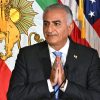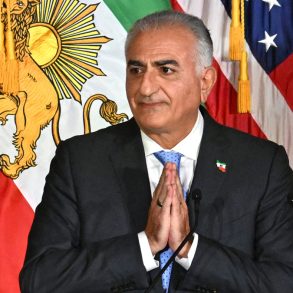Tensions between the United States and Iran have once again reached a critical point. President Donald Trump has warned that if Iran does not agree to a new nuclear deal with Washington, there will be severe consequences. In his strongest threat yet, Trump said in a televised interview, “If they don’t make a deal, there will be bombing. It will be bombing the likes of which they have never seen before.” His comments have raised fears of a new military conflict in the Middle East, especially as the situation between Iran and its neighbors continues to escalate.
On March 12, President Trump sent a formal letter to Iran’s Supreme Leader, Ayatollah Ali Khamenei, urging him to reopen nuclear negotiations. The letter was delivered through the government of Oman, which has often served as a neutral party in discussions between the United States and Iran. Trump revealed the existence of the letter in an interview, saying, “I’ve written them a letter saying, ‘I hope you’re going to negotiate because if we have to go in militarily, it’s going to be a terrible thing.’”
Trump’s letter reportedly gave Iran a two-month deadline to reach a new agreement. If no deal is made by then, the president has threatened both military action and the reintroduction of “secondary tariffs” on countries that continue to do business with Iran. “There’s a chance if they don’t make a deal, that I will do secondary tariffs on them like I did four years ago,” Trump told NBC News.
These threats are part of Trump’s attempt to stop Iran from continuing its uranium enrichment program, which has advanced significantly since he pulled the United States out of the 2015 nuclear deal in his first term. That deal, signed by Iran and several world powers, had placed strict limits on Iran’s nuclear activities in exchange for relief from international sanctions. After the U.S. withdrew from the agreement, Iran began enriching uranium at much higher levels, pushing its program closer to the threshold needed to build a nuclear weapon.
Iran’s Initial Reaction
Iran did respond to Trump’s letter, but it did not accept the offer for direct talks. According to Iranian Foreign Minister Abbas Araghchi, Iran sent its response back to the U.S. through Oman, but the reply made it clear that Tehran would not engage in direct negotiations with the Trump administration.
President Masoud Pezeshkian of Iran spoke about the situation during a Cabinet meeting and explained the reasons behind Iran’s rejection. “We don’t avoid talks,” Pezeshkian said. “It’s the breach of promises that has caused issues for us so far. They must prove that they can build trust.”
The Iranian president was referring to the United States’ withdrawal from the nuclear deal in 2018. Since that time, many Iranian leaders have said that they no longer believe the U.S. can be trusted to keep its word. Despite rejecting direct negotiations, Pezeshkian did not close the door entirely. He said that Iran was still open to indirect discussions through Oman or other intermediaries.
Iran’s Hardening Position
Iran’s stance has grown more firm in recent weeks, especially after Supreme Leader Khamenei warned that talks with the U.S. under Trump’s leadership were “not intelligent, wise or honorable.” Following that statement in February, President Pezeshkian also began using stronger language, showing less willingness to work with the Trump administration.
Although Iran’s government has sent mixed messages, the general trend has been toward confrontation. On Jerusalem Day, which is a day of protest against Israel, demonstrators were told to shout only “Death to Israel” rather than the usual chant of “Death to America” as well. This shift raised some eyebrows, but soon after, Iran’s state media reminded the world of its position. Press TV, Iran’s English-language outlet, published a piece listing U.S. military bases in the region that could be targeted if Iran is attacked. One of the bases mentioned was Camp Thunder Cove on Diego Garcia in the Indian Ocean. That base recently received B-2 stealth bombers from the U.S., aircraft that are capable of launching powerful bunker-busting bombs meant to destroy underground facilities like those used by Iran’s nuclear program.
Iranian officials have also issued strong warnings about the consequences of any military strike. Mohammad Bagher Qalibaf, the speaker of Iran’s parliament, said, “If they violate Iran’s sovereignty, it will be like a spark in a gunpowder depot, setting the entire region ablaze. In such a scenario, their bases and their allies will not be safe.”
At the same time, Iran’s direct military actions have shown limited success. Its recent missile and drone strikes on Israel caused very little damage. In response, Israel destroyed several of Iran’s air defense systems, further showing the high cost of confrontation.
A Long History of Distrust
This is not the first time Trump has reached out to a long-time enemy in hopes of negotiating a nuclear agreement. During his first term, he exchanged letters and held meetings with North Korean leader Kim Jong Un. While those talks gained international attention, they ended without a final deal. A similar situation may be unfolding now with Iran.
Trump also attempted to send a letter to Khamenei in 2019 through Japanese Prime Minister Shinzo Abe. That effort failed, and the Iranian leader mocked Trump’s attempt at diplomacy. Now, as both the U.S. and Israel insist that Iran must not be allowed to develop a nuclear weapon, the fear of a major military clash is rising again.
Iran continues to insist that its nuclear program is only for peaceful energy use, but recent reports by the United Nations’ nuclear watchdog say otherwise. According to a report in February, Iran has significantly increased its stockpile of uranium enriched to 60 percent purity. That level is far beyond what is needed for civilian energy and just short of the level required to make a nuclear bomb.
Adding to the tension is the memory of the U.S. drone strike that killed Iranian General Qassem Soleimani in Baghdad in January 2020. Iranian leaders have not forgotten that event. There have even been claims that Iran plotted to assassinate Trump in retaliation, though Tehran has denied this.
What Comes Next?
The coming weeks will be critical. Trump’s two-month deadline is already underway, and the movement of U.S. military forces suggests that the threat of airstrikes is real. Meanwhile, Iran’s refusal to enter direct talks and its continued uranium enrichment are keeping the world on edge.
The future of U.S.-Iran relations remains uncertain. While Trump says he prefers a peaceful solution, his latest comments have focused heavily on the use of force. “If they don’t make a deal, there will be bombing,” he repeated during a recent phone interview with NBC News.
Unless something changes soon, the standoff may only grow more dangerous. Both sides are standing firm, and without trust or compromise, the risk of conflict is becoming harder to avoid. The world will be watching to see whether diplomacy has any chance of success or whether military action is on the horizon.








